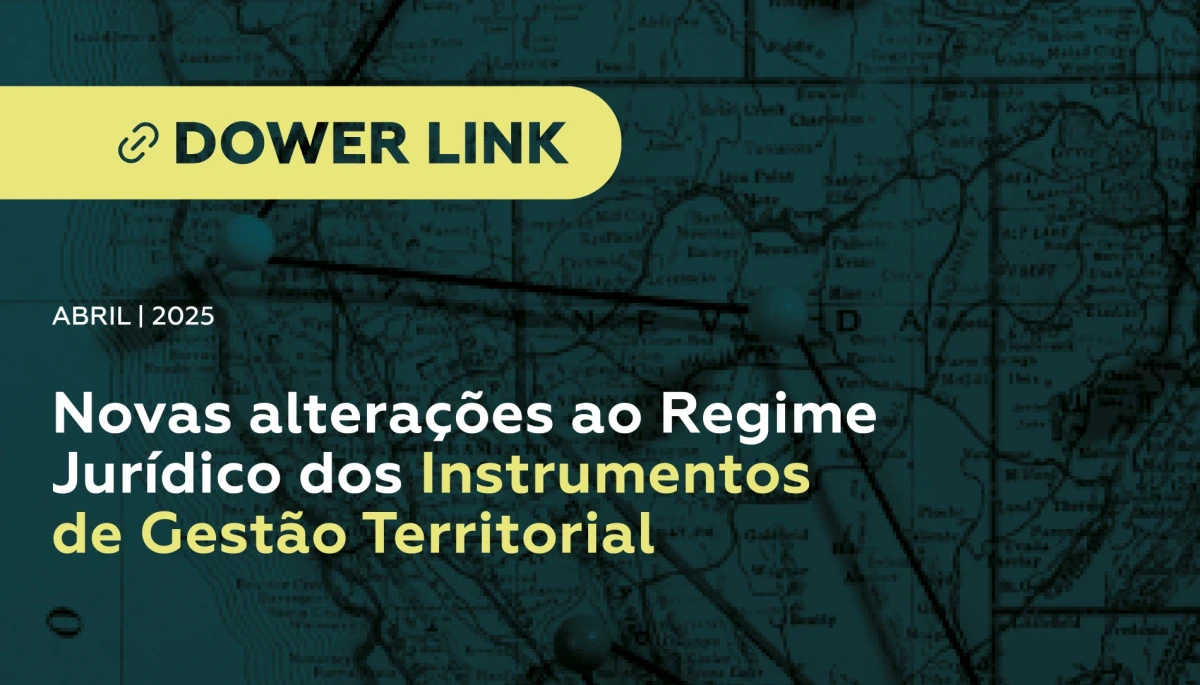
New amendments to the Legal Framework for Territorial Management Instruments

We had already indicated that, on December 30 of last year, Decree-Law no. 117/2024 had been published, introducing significant changes to the Legal Framework for Territorial Management Instruments (RJIGT).
In broad terms, and recalling what has already been addressed, the aforementioned Decree, which found its justification (at least in the view of the President of the Republic) in the urgency of using European funds and in promoting housing construction, introduced the concept of moderately priced housing and the possibility of reclassifying land as urban for housing purposes and complementary uses, provided certain conditions were met.
Almost four months later, an amendment to the said Decree has emerged, introduced by Law no. 53-A/2024, of April 9, and it is therefore necessary to highlight the main changes:
- Elimination of the concept of moderately priced housing
The possibility of reclassifying rural land as urban land, introduced by Decree-Law no. 117/2024 of December 30, depended, among other factors, on allocating at least 70% of the total above-ground construction area to public housing or moderately priced housing.
Moderately priced housing was defined as housing in which the price per square meter of gross private area did not exceed the median sale price per square meter of housing at the national level.
Well then, the aforementioned concept lasted just over three months, having been eliminated by Law no. 53-A/2025 of April 9.
- Widening of the range of permitted purposes for construction on rural land
With the elimination of the concept of moderately priced housing, the range of housing types that can make up the required 70% for land reclassification has been expanded.
Alongside public housing, which was already included in the amendment of December last year, there is now the possibility for 70% of the total above-ground construction area to be allocated to affordable rental housing, as set out in Decree-Law no. 68/2019 of May 22, or to controlled-cost housing, as defined in Ordinance no. 65/2019 of February 19.
- Clarification of “complementary uses”
The initial wording of the amendment introduced to Article 72-B(1) of the RJIGT provided that municipalities could determine the reclassification to urban land “whenever the purpose is housing or related to housing and complementary uses.” However, it did not define the concept of complementary uses, thus allowing for multiple interpretations.
Therefore, it has now been clarified that complementary uses are considered to be “all functions that are dependent on or complementary to the purpose of housing, and which must not be in conflict with it.”
- Alteração dos pressupostos da reclassificação
In order to allow the proclaimed construction on rural land, the following cumulative requirements had to be met:
- The consolidation and coherence of the urban development with the existing urban area had to be ensured;
- At least 70% of the total above-ground construction area had to be allocated to public housing or moderately priced housing;
- A development unit had to be defined and implemented;
- General and local infrastructure, as well as collective-use facilities and green spaces, had to exist or be guaranteed to meet the needs arising from the new uses;
- The development had to be compatible with the local housing strategy, municipal housing charter, or housing stock.
The only requirement that remained unchanged is the need for a development unit to be defined and implemented.
Regarding the requirement mentioned in point 1., it is now required to ensure contiguity with urban land, thus guaranteeing the consolidation and coherence of the urban development with the existing urban area.
Additionally, the requirement for the existence or guarantee of collective-use facilities and adequate green spaces to meet the needs arising from the new uses has been eliminated.
- Clarification of the consequences of failing to include classification and qualification rules in plans
As is well known, since the enactment of Decree-Law no. 80/2015, of May 14, the Administration has been required to include the classification and qualification rules set out in that decree in municipal and intermunicipal plans.
This obligation, which should have been fulfilled within five years from the date of enactment of Decree-Law no. 80/2015, of May 14, has been successively extended, resulting in many municipalities, to date, failing to incorporate these rules in their plans.
To compel the Administration to include these rules in their plans, it was previously determined that non-compliance due to factors attributable to the Administration would result in the suspension of the right to apply for community and national financial support, excluding those related to health, education, housing, or social support.
Decree-Law no. 117/2024 removed the possibility of suspending the right to apply for such support and instead determined that the rules concerning urbanizable areas or programmed urbanization would be automatically suspended until the classification and qualification rules were included. During this period, no acts or operations that implied land occupation, use, or transformation could take place in those areas.
Given the discrepancies that arose in interpreting this regime, the legislator chose to clarify that the suspension referred to was not automatic and must be decreed by the Territorial Coordination and Regional Development Commission (CCDR).
- Provision that the current regime is exceptional and temporary
The Decree in question stipulated that the changes introduced by Decree-Law no. 117/2024, of December 30, will only be in effect for four years from the date of their implementation, i.e., from December 31, 2024.
However, it has been foreseen that the mentioned deadline could be extended, with such an extension being preceded by the presentation and discussion in the National Assembly, by the Government, of a report on the application of this Decree, which would support the decision.



